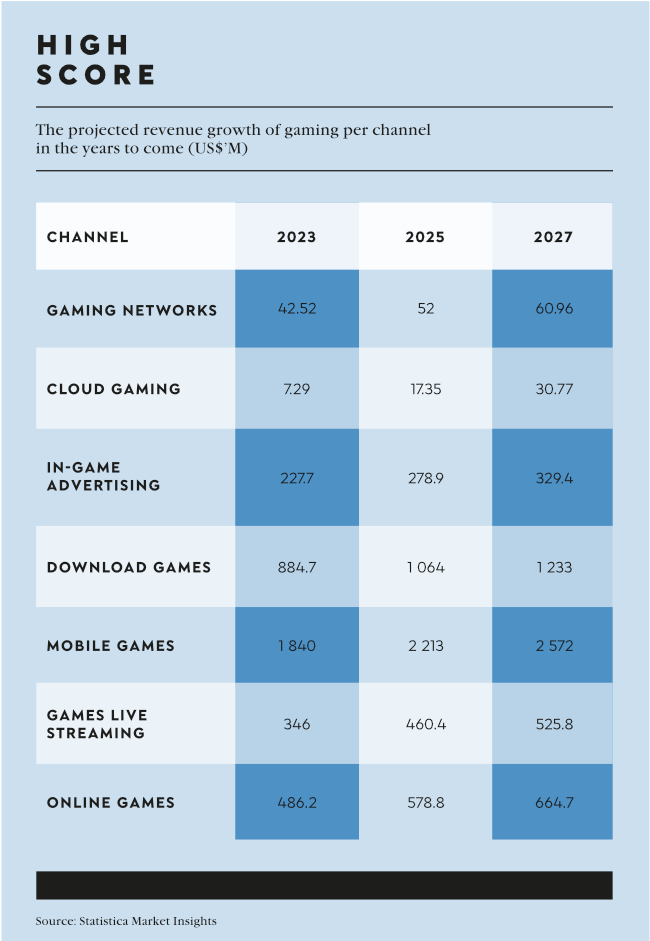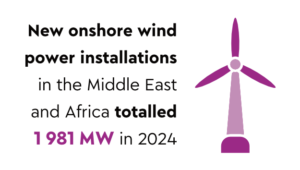The gaming industry has witnessed remarkable growth worldwide, and Africa is no exception to this trend. As more Africans gain access to smartphones and the internet, the gaming industry on the continent is on the brink of becoming a multi-billion-dollar business, presenting a host of opportunities for businesses and entrepreneurs to tap into this thriving market.
Africa has a young population, with a median age significantly lower than other continents. This youth demographic is highly tech-savvy and inclined toward digital entertainment, and with more free time and disposable income, they are eager consumers of gaming content.
According to research consultancy Mordor Intelligence, the continent’s gaming market is currently estimated at US$1.92 billion, and expected to reach US$3.33 billion by 2028. That’s an impressive CAGR of 11.62%.
It attributes this rise to an improvement in technology and internet network access. ‘The growing mobile penetration in the African region had accelerated since 2019 when during the year, about 272 million sub-Saharan Africans started using mobile, according to the GSMA,’ its states. ‘Moreover, this number is expected to increase to 475 million by 2025, among which more than a quarter of these connections will be on a 4G network.’ The report adds that in North Africa, alone 290 million people own cellphones. ‘This high usage of mobile phones with 5G networks is expected to drive the market significantly.’
The gaming industry’s rapid expansion in Africa presents a multitude of opportunities for businesses, with promising avenues for entrepreneurs and companies looking to capitalise on this emerging market.
One of the most significant opportunities in the African gaming industry lies in game development. African developers have been making a mark in the global gaming scene, with studios producing games that reflect African culture, stories and experiences. This has led to a growing demand for locally developed games, catering to a diverse African audience. As a result, businesses that invest in game development and support local talent can tap into this demand.
As an example, in February 2022, Union Bank joined forces with the Nigeria-based gaming company Kucheza through its educational platform Edu360. The collaboration aimed to host an instalment of the Mobo Game Jam, an annual game development competition created to foster inclusivity, sustainability and humanity among young innovators aged eight to 18 from Nigeria and the UK. The competition’s primary objective is to advocate for gaming as a means to tap into the creative potential of young individuals while also addressing the digital skills gap within the educational system.
Designed to promote gaming as a tool for learning, the Mobo Game Jam – which is also supported by Ukie Education’s Digital Schoolhouse (a UK-based not-for-profit programme that enables primary schools, secondary schools and colleges to experience free creative computing workshops from their local schoolhouse) – strives to encourage cultural exchange between participants by promoting inclusivity, sustainability and humanity in their ideas.
Cameroon’s Kiro’o Games is another game-development studio, known for its African-themed role-playing game, Aurion: Legacy of the Kori-Odan. The studio also held a successful crowdfunding campaign and earned international acclaim for its unique storytelling and cultural representation.
According to a report by Newzoo, which provides video and gamer data, South Africa is the largest gaming market in sub-Saharan Africa, with an estimated US$290 million in consumer spending on games in 2021. And at 40%, it also leads in the portion of the population who play games.
This is good news for startups, such as South Africa’s Carry1st, which is strategically positioning itself to capitalise on the industry’s growth phase.
Since its inception in 2018, Carry1st, a publisher of social games and interactive content in Africa, has successfully secured funding from various investors. Notably, it has garnered support from Google through its Africa Investment Fund and Avenir Growth Capital. It has also received strong backing from top-tier funds specialising in web3 and gaming, including Andreessen Horowitz (a16z), Konvoy Ventures and, most recently, Bitkraft Ventures, the primary investor in Carry1st’s newly unveiled US$27 million pre-Series B funding round. In this financing round, both a16z and Konvoy Ventures participated, alongside investors such as TTV Capital, Alumni Ventures, Lateral Frontiers VC and Kepple Ventures.
‘We now have, in our minds, the three best funds that focus on gaming and web3. And so it just adds even more resources, perspective and assistance to help us achieve our goals,’ Carry1st CEO Cordel Robbin-Coker told TechCrunch in an interview.

The gaming start-up has also entered into other partnerships, including a ‘large game licensing deal’. Alongside its collaboration with Riot Games, Carry1st is further building on the success of its recent partnership with Call of Duty: Mobile in South Africa, which took place in the last quarter of 2022.
In this venture, Carry1st served as a local partner, providing guidance and direction to the video game franchise on how to expand its presence in South Africa during a three-month pilot test.
‘South Africa is a promising market for them, and they were enthusiastic about having a local partner to help navigate and execute a pilot over the past three months,’ says Robbin-Coker. ‘We hope this will lead to deeper engagement and even more significant opportunities for that franchise, not only in South Africa but potentially across the entire continent.’
The rise of game streaming and content creation on platforms such as Twitch and YouTube is also creating more opportunities for African gamers and content creators, which is seeing businesses support and collaborate with local gaming influencers, streamers and content creators to promote their products and services.
As the African gaming industry continues to grow, businesses can leverage advertising and brand partnerships to reach a highly engaged and youthful audience, through in-game advertisements and even sponsoring e-sports events and teams.
After all, according to the Newzoo report, there are gaming markets around the continent with consumers who are big spenders, among them Nigeria at US$185 million, Ghana at US$42 million, Kenya US$38 million, and Ethiopia US$35 million.
However, while the industry offers promising opportunities, businesses must also navigate challenges and considerations specific to the continent. While internet connectivity has improved, there are still regions with limited access to reliable internet, which has an impact on gaming’s reach. With this in mind, in November 2022, Rain – an operator of South Africa’s 4G and 5G data networks, announced a partnership with NVIDIA. This collaboration aims to introduce high-performance cloud gaming to South Africa through GeForce NOW, NVIDIA’s premium cloud gaming service.
GeForce NOW streams PC games from powerful GeForce-driven servers in the cloud, providing an ultra-low latency gaming experience. As a result of this collaboration, millions of South African users are set to be able to gain access to top-tier gaming titles and a vast streaming library of more than 1 400 games. These include popular titles such as a Plague’s Tale: Requiem and Cyberpunk 2077, as well as more than 100 free-to-play titles, among them Fortnite and Genshin Impact.
Africa’s gaming industry is clearly evolving into serious business, and with connectivity levels on the rise, the continent’s players and developers are now competing on a global playing field.


















